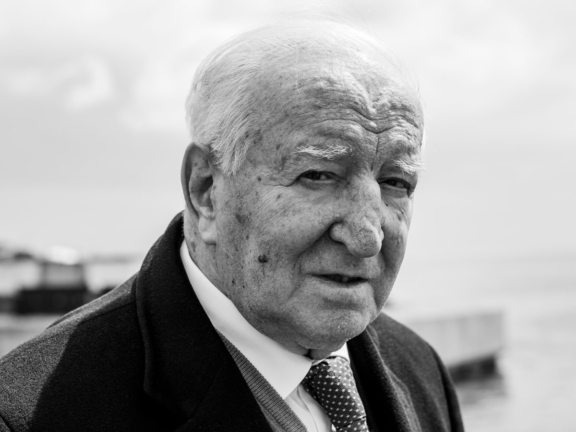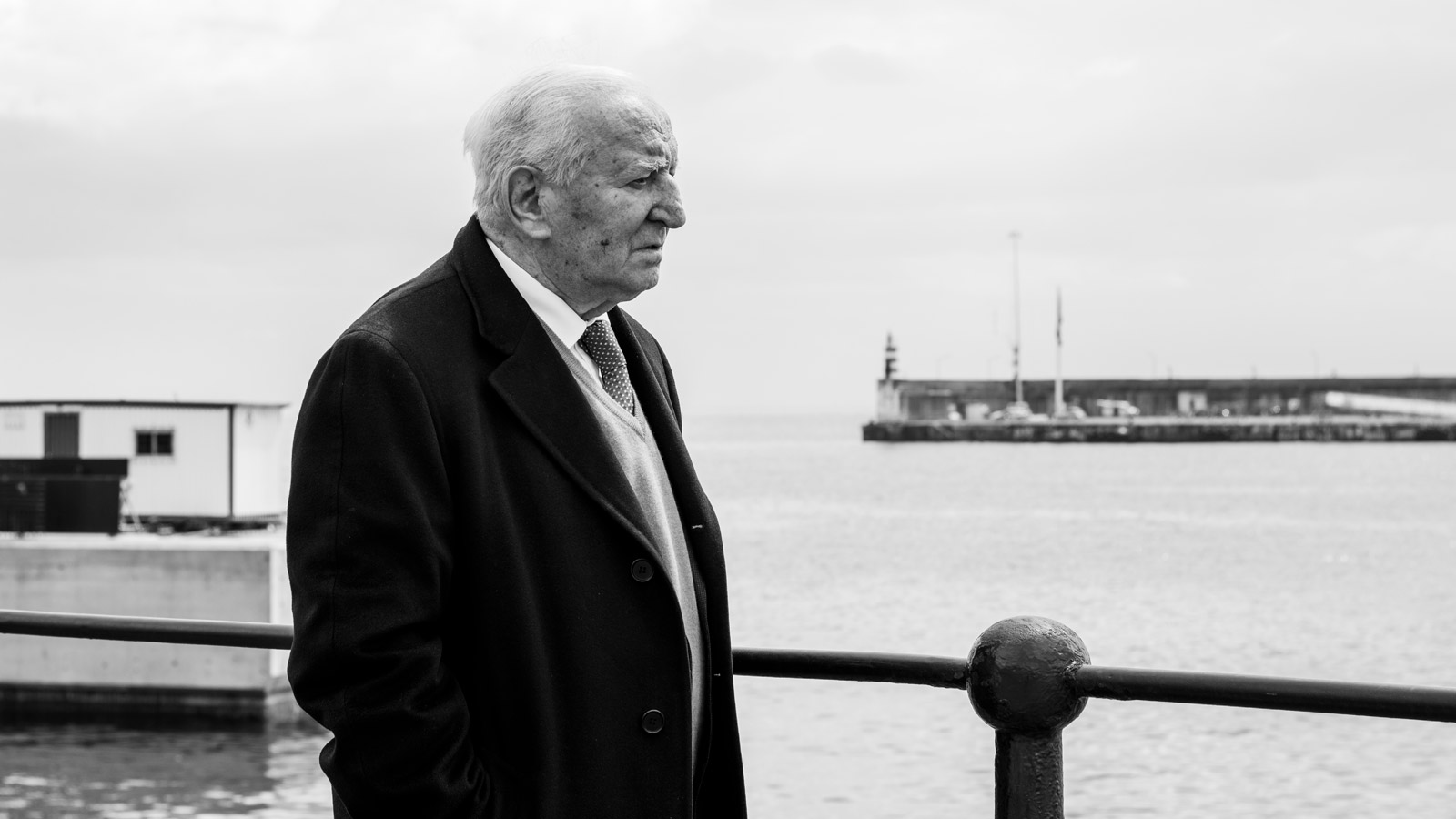
Eduardo Lourenço: A Life in Writing
Colloquium to commemorate the 100th anniversary of the birth of Eduardo Lourenço
Event Slider
Date
- / Cancelled / Sold out
Location
Auditorium 2 Calouste Gulbenkian FoundationEduardo Lourenço wrote that Montaigne “didn’t know who he was and, to find out, decided to write about himself”, converting “the endless amazement of this encounter” with his own existence into a “life in writing”. This connection between personal and universal experience was one of the clear hallmarks of Lourenço the essayist, who was unrivalled in this field in the Portuguese language. This colloquium pays homage to Eduardo Lourenço on the 100th anniversary of his birth, promoting conversations with readers, friends and experts on his work on some of its key themes: the mythical figure of Pessoa, modern poetry, Portugal and the relationship between life and thought.
The exhibition To See is to Be Seen, a series of portraits of Eduardo Lourenço by the photographer Vitorino Coragem, will be presented as part of this colloquium.
Photo © Vitorino Coragem
Speakers
-
António M. Feijó
António M. Feijó is the president of the board of trustees of the Calouste Gulbenkian Foundation since May 2022. A professor in the Department of English Studies and on the Literary Theory Programme at the School of Arts and Humanities, Lisbon University (FLUL), he was previously director of the same faculty and vice-chancellor and dean of Lisbon University, not to mention press director at the university and director of its magazine. He has a PhD (in British and North American Literature) from Brown University (1985) and an MA (in British and North American Literature) from the State University of New York at Albany (1979).
Author of books and essays on subjects relating to British, North American and Portuguese literature, as well as translations of plays (Shakespeare’s Twelfth Night, Hamlet and King Lear, and works by Oscar Wilde and Fernando Pessoa, among others), he was chair of the Independent General Council of RTP, non-executive director of the Casa de Mateus Foundation and non-executive member of the board of trustees of the Calouste Gulbenkian Foundation from 2018 to 2022.
-
Carlos Mendes de Sousa
Carlos Mendes de Sousa is a professor at Minho University where he specialises in Brazilian literature and modern and contemporary Portuguese poetry. Among his works are the books Clarice Lispector. Figuras da escrita [Clarice Lispector: Literary Figures] and Clarice Lispector. Pinturas [Clarice Lispector: Paintings]. Besides his essays on Lispector, of note are his works on João Cabral de Melo Neto, Miguel Torga, Sophia de Mello Breyner Andresen, Eugénio de Andrade, Fiama Hasse Pais Brandão and Eduardo Lourenço. He is co-director of the Luís Miguel Nava Foundation and the poetry magazine Relâmpago.
-
Clara Caldeira
Clara Pinto Caldeira was born in Lisbon in 1977. She graduated in Communication Studies, is working towards a PhD in Cultural Studies and is a junior researcher at the Communication and Culture Study Centre at the Catholic University of Portugal. She has worked as a journalist on various TV projects on cultural issues and was part of the Câmara Clara [Light Room] programme team at RTP 2. She recently worked on the documentary Francisco de Holanda, a Luz Esquecida do Renascimento [Francisco de Holanda: The Forgotten Light of the Renaissance].
-
Guilherme d'Oliveira Martins
Guilherme d’Oliveira Martins is an executive board member of the Calouste Gulbenkian Foundation and president of the Grand Council of the National Culture Centre. He was a member of Parliament and Minister of Education, Presidency and Finance. He holds honorary doctorates from Universidade Lusíada [Lusíada University], Universidade Aberta [Open University] and Instituto Superior de Ciências Sociais e Políticas (ISCSP) [Higher Institute of Social and Political Sciences].
-
Isabel Lucas
Isabel Lucas is a journalist and literary critic. She graduated in Media Studies from NOVA University Lisbon, became a TV journalist and joined the editorial teams at some of Portugal’s biggest newspapers and magazines. A freelance writer since 2012, she writes regularly for the newspaper Público and is a contributor to the magazine Ler, Quatro Cinco Um and Antena 3. Her work has appeared in various national and international publications. She is the author of the books Isabel Lucas – Conversas com Vicente Jorge Silva [Isabel Lucas – Talks with Vicente Jorge Silva] (Temas e Debates, 2013), Viagem ao Sonho Americano [Journey to the American Dream] (Companhia das Letras, 2017) and Viagem ao País do Futuro [Journey to the Country of the Future] (CEPE – Brasil e Companhia das Letras – Portugal). Of note among her various articles as a journalist are reports and interviews with some of America’s most acclaimed authors. She is also co-author of various books on dance and the visual arts. In 2022 she curated the programme for the Portuguese Pavilion at the São Paulo Book Biennial. She is also curator of the Oceans Literature Prize (Prémio Oceanos de Literatura) and a guest lecturer at the Higher Institute of Media Studies (ESCS) in Lisbon.
-
Joana Matos Frias
Joana Matos Frias lectures in the School of Arts and Humanities at Lisbon University (FLUL) and is a member of the project Estranhar Pessoa [Admiring Pessoa]. She has written Cinefilia e cinefobia no Modernismo português [Cinephilia and Cinephobia in Portuguese Modernism] (2014), O murmúrio das imagens [The Murmur of Images] (2018) and Oscilações (poesia em todos os sentidos) [Oscillations (Poetry in Every Sense)] (2022), among other books of essays. She has had articles published on modern and contemporary Portuguese and Brazilian works and authors in various magazines and collective volumes.
-
João Dionísio
João Dionísio is lecturer of Portuguese literature and textual criticism in the School of Arts and Humanities at Lisbon University (FLUL) and a researcher at the same university’s Linguistics Centre (CLUL). He wrote his PhD thesis on the influence of Father João Cassiano on the Leal Conselheiro [The Loyal Advisor], the moral treatise written by King Duarte of Portugal. He contributed to the genetic editing of Fernando Pessoa’s work, for which he prepared three volumes, and published Agora entra no vento. Génese e tradução na obra de M. S. Lourenço [Now into the wind. Genesis and Translation in the Work of M. S. Lourenço] (Biblioteca Nacional, 2020) and the book of essays Doença bibliográfica [Bibliographical Illness] on Fernando Pessoa’s legacy (Imprensa Nacional, 2021). In 2022, he published the genetic editing of Almeida Garrett’s Frei Luís de Sousa [The Pilgrim] (Imprensa Nacional) and Os livros de M. S. Lourenço [The Books of M. S. Lourenço] (FLUL/Imprensa Nacional). In the context of Eduardo Lourenço’s complete works, he wrote a book compiling O Labirinto da Saudade [The Labyrinth of Longing] and other texts on Portuguese culture. He coordinates the philology group at CLUL and was chair of the European Society for Textual Scholarship from 2013 to 2016.
-
João Tiago Lima
João Tiago Lima is assistant professor with tenure in the Philosophy Department at Évora University and a researcher at the Research Centre in Political Science (CICP). His main publications include O Fogo do Espírito – Desporto, Olimpismo e Ética [The Fire of the Spirit – Sport, Olympism and Ethics] (2007), Existência e Filosofia – O Ensaísmo de Eduardo Lourenço [Existence and Philosophy – The Essay-Writing of Eduardo Lourenço] (2008), Falar Sempre de Outra Coisa – Ensaios sobre Eduardo Lourenço [Always Talking of Other Things – Essays on Eduardo Lourenço] (2013), Estética e Desporto [Aesthetics and Sport] (2016) and Jogar Sem Bola – Literatura, Filosofia e Futebol [Playing Without A Ball – Literature, Philosophy and Football] (2018). As an editor, his works include Correspondência [Correspondence] (2019), with Elisa Nunes Esteves, Vergílio Ferreira and Maria Lúcia Dal Farra, and A raia na água – Eduardo Lourenço e o mundo hispânico [Dividing Line in the Water – Eduardo Lourenço and the Hispanic World] (2021), with Antonio Sáez Delgado. He was scientific coordinator with Carlos Mendes de Sousa of Obras Completas de Eduardo Lourenço [Complete Works of Eduardo Lourenço] (Fundação Calouste Gulbenkian).
-
José Carlos de Vasconcelos
José Carlos de Vasconcelos is a journalist, lawyer and writer. He has been director of the review JL – Jornal de Letras, Artes e Ideias since he created it 42 years ago. He was founder and editorial director of the newspaper O Jornal and the magazine Visão, for which he is currently a consultant. He was a director of the newspaper Diário de Notícias and a commentator for RTP news. Awarded every career honour, he has presided over various bodies within the journalists’ trade union and club.
He graduated in law from Coimbra University, where he was prominent in the fight for student rights. As a lawyer, he defended political prisoners, journalists and intellectuals. He held countless poetry recitals. He was a member of the Black Book Committee on the Fascist Regime, the political committees for the presidential candidacies of Ramalho Eanes and António Nóvoa, and the committees of honour for Jorge Sampaio and the 500th anniversary of the Discovery of Brazil. He was a member of parliament, chair of the Luso-Brazilian Committee and member of the General Council of the Gulbenkian Foundation and of Coimbra University. He is also author of nine poetry books, three for children and young people, two books of interviews and one about freedom of the press. Among other distinctions, he has been awarded the Luso-Brasileira Foundation Prize and the Vasco Graça Moura – Cultural Citizenship Prize.
-
Lídia Jorge
As a writer, Lídia Jorge is representative of the Portuguese post-revolution generation. Her debut book, O Dia dos Prodígios [The Day of Prodigies], is considered a milestone in new contemporary Portuguese literature. Since its publication, she has written novels, short stories, children’s books, plays, essays and poetry. Her novel A Costa dos Murmúrios [The Murmuring Coast] has been adapted for the big screen and several of her works have been performed on stage. Her books have been translated into more than twenty languages and she has won various national and international prizes for her novels and for her work as a whole. International prizes include the Albatros Literaturpreis (2006) from the Günter Grass Foundation and the Spanish-Portuguese Art and Culture Prize (2015).
In 2013, Magazine Littéraire ranked her as one of the ten most influential literary voices of the present day. Os Memoráveis [The Memorable] (2014) is the book that has most transfigured and cemented Portuguese mythology in recent decades. Her latest novel, Estuário [Estuary] (2018), won the TSD Grand Literary Prize and was later shortlisted for the Prix Médicis International, being considered by Le Monde as one of the finest portrayals of the state of the world today. Em Todos os Sentidos [In Every Sense] (2020), a set of stories that was serialised and read by her during 2019 on the Portuguese radio station Antena 2, was awarded the Portuguese Writers’ Association’s Grand Prize for Storywriting. In November 2020, Jorge also won the FIL Award for Literature in Romance Languages.
-
Luís Miguel Queirós
Luís Miguel Queirós was born in Porto in 1962 and is a journalist for the newspaper Público where he writes on cultural issues and occasionally on poets and poetry. He organised an anthology of 20th-century Portuguese lyrical poetry – Vingt et un poètes pour un vingtième siècle portugais – published in 1994 by the French publisher L’Escampette and is co-author, with Joana Matos Frias and Rosa Maria Martelo, of the anthology Poemas com Cinema [Cinematic Poems], published in 2010 by Assírio & Alvim.
-
Margarida Calafate Ribeiro
Margarida Calafate Ribeiro is a researcher-coordinator at the Social Studies Centre of Coimbra University, a lecturer on the Post-Colonialism and Global Citizenship PhD programme (CES/FEUC) at Coimbra University and, with Roberto Vecchi, responsible for the Eduardo Lourenço – Camões Chair at the University of Bologna. She coordinated, among others, the European Research Council project MEMOIRS – Children of Empire and European Postmemories and is author of various books and articles. Her latest publication co-authored with Fátima da Cruz Rodrigues is entitled Des-Cobrir a Europa, Filhos de Impérios e Pós-memórias Europeias [Dis-Covering Europe, Children of Empire and European Postmemories] (Afrontamento, 2022).
-
Pedro Sepúlveda
Pedro Sepúlveda is assistant professor of Portuguese Studies at the NOVA School of Social Sciences and Humanities, in Lisbon, and a researcher at the Institute of Literature and Tradition Studies of that same School.. His work examines modern literature, theory of literature and textual criticism, with particular focus on Fernando Pessoa and modernism in Portuguese literature. He has published Os livros de Fernando Pessoa [The Books of Fernando Pessoa] (Ática, 2013) and the anthology O planeamento editorial de Fernando Pessoa [The Editorial Planning of Fernando Pessoa] (with Jorge Uribe, INCM, 2016), and edited volume IX of Obras Completas de Eduardo Lourenço: Pessoa Revisitado – Crítica Pessoana I (1949-1982) [Complete Works of Eduardo Lourenço: Pessoa Revisited – Criticism I (1949-1982)] (Gulbenkian, 2020). He coordinates the research project Estranhar Pessoa [Admiring Pessoa] and the digital edition of editorial projects and publications on Pessoa’s life.
-
Richard Zenith
Settled in Portugal for more than 30 years, Richard Zenith is a writer, translator and renowned expert (national and international) on the life and work of Fernando Pessoa. He has been connected to the Study Group on Portuguese Modernism since 1997 but his work on Pessoa’s oeuvre is vast and marked by a certain independence. He arranged The Book of Disquiet and many other works by Pessoa, published by Assírio & Alvim, published a photo-biography of Pessoa and co-curated the exhibition Fernando Pessoa: Plural Como o Universo [Fernando Pessoa: As Multifarious As the Universe] (São Paulo, 2010; Rio de Janeiro, 2011; Lisbon, 2012). In addition to translating various works by Pessoa into English, he has also translated Galician-Portuguese folk songs, Camões, Carlos Drummond de Andrade, Sophia de Mello Breyner Andresen and many living poets. Richard Zenith was awarded the Pessoa Prize in 2012.
In 2022, he published Pessoa: Uma Biografia [Pessoa: A Biography], the most complete biographic work on Pessoa ever written. It was rated one of the best books of 2021 by several prestigious English-language publications – The New York Times, The Spectator, The New Statesman, Kirkus Reviews and Publishers Weekly – and was shortlisted for the Pulitzer Prize 2022.
-
Rita Patrício
Rita Patrício teaches in the School of Arts and Humanities at Lisbon University (FLUL) and is a member of its Comparative Studies Centre. She is part of the project Estranhar Pessoa [Admiring Pessoa]: an examination of his heteronymous pretensions. She has published Episódios. Da teorização estética em Fernando Pessoa [Episodes: Aesthetic Theorising on Fernando Pessoa] (2012) and Apontamentos. Pessoa, Nemésio, Drummond [Notes: Pessoa, Nemésio, Drummond] (2016), and co-edited As Conferências do Cinquentenário da Teoria da Literatura de Vítor Aguiar e Silva [The 50th Anniversary Conferences of the Theory of Literature of Vítor Aguiar e Silva] (2020) with Osvaldo M. Silvestre. She is an author of essays, in collective volumes and specialist magazines, on modern and contemporary Portuguese literature.
-
Roberto Vecchi
Roberto Vecchi is professor of Portuguese and Brazilian literature and History of Portuguese Culture at the University of Bologna. Since 2007, he is the coordinator, with Margarida Calafate Ribeiro, of the Eduardo Lourenço – Camões Chair. He was chair of the International Association of Lusitanists from 2014 to 2021 and is author of an extensive bibliography on the theory and history of Portuguese-speaking cultures, most prominently A literatura Portuguesa. Modos de ler [Portuguese Literature: Modes of Reading] (2022), co-authored with Vincenzo Russo.
Programme
09:45 / Opening
Guilherme d’Oliveira Martins
10:00 / Introduction
Pedro Sepúlveda
10:15 / Eduardo Lourenço: The Sublime Enchantment of the Unconsidered
Roberto Vecchi
— COFFEE BREAK —
11:30 / The Pessoa Myth
António Feijó
Rita Patrício
Pedro Sepúlveda
Moderator: Richard Zenith
— LUNCH BREAK —
14:30 / Poetry and Modernity
Carlos Mendes de Sousa
Joana Matos Frias
Moderator: Luís Miguel Queirós
15:30 / Portugal
João Dionísio
Margarida Calafate Ribeiro
Moderator: Clara Caldeira
— COFFEE BREAK —
17:00 / Life and Thought
João Tiago Lima
José Carlos de Vasconcelos
Moderator: Isabel Lucas
18:00 / Eduardo Lourenço: The Glimpse of an Instant
Lídia Jorge
19:00 / Closing Concert
Transfigured Night (Verklärte Nacht), Op. 4, Arnold Schönberg (1874–1951)
Gulbenkian Orchestra String Sextet
Maria Balbi – Violin
Miguel Simões – Violin
Alexandra Mendes – Viola
Leonor Braga Santos – Viola
Varoujan Bartikian – Cello
Hugo Paiv – Cello
The Calouste Gulbenkian Foundation reserves the right to collect and keep records of images, sounds and voice for the diffusion and preservation of the memory of its cultural and artistic activity. For further information, please contact us through the Information Request form.


